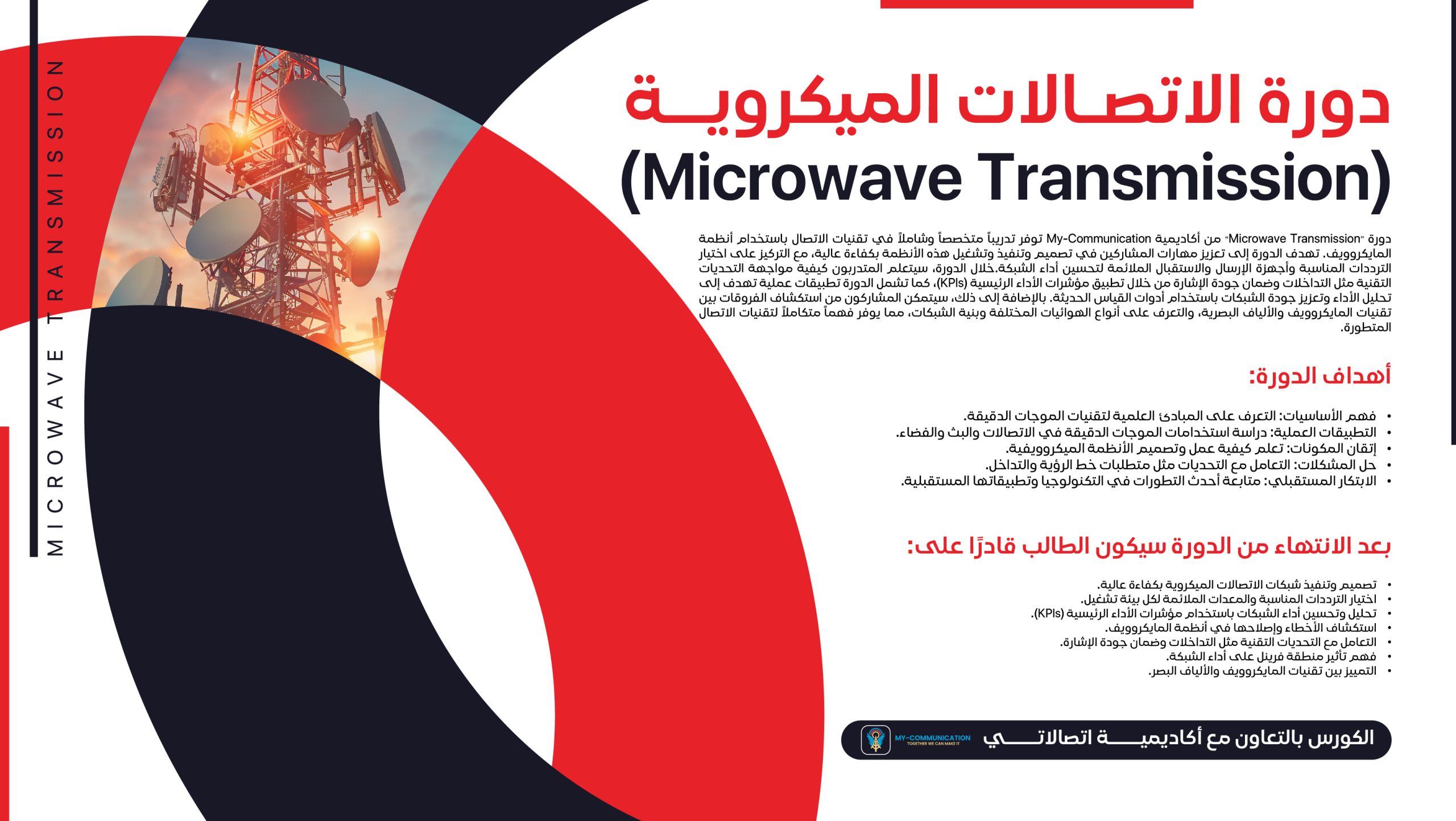Overview:
The “Microwave Transmission” course from My-Communication Academy offers specialized and comprehensive training in microwave communication technologies. The course aims to enhance participants’ skills in designing, implementing, and operating these systems efficiently. It focuses on selecting appropriate frequencies and suitable transmission and reception equipment to optimize network performance. Participants will learn how to tackle technical challenges such as interference and ensure signal quality by applying Key Performance Indicators (KPIs). The course includes practical applications for performance analysis and improving network quality using modern measurement tools. Additionally, participants will explore the differences between microwave and optical technologies, understand various antenna types, and grasp network architectures, providing a thorough understanding of advanced communication techniques.
Invest in your professional future and join the “Microwave Transmission” course to become proficient in building robust and effective communication networks using microwave technology.
Objectives:
- Understand the Basics: Learn the scientific principles of microwave technology.
- Practical Applications: Study the use of microwave transmission in communications, broadcasting, and space.
- Master Components: Understand how to design and operate microwave systems.
- Problem-Solving: Address challenges such as line-of-sight requirements and interference.
- Future Innovations: Explore the latest developments and future applications in microwave technology.
Course Content:
- Types of Transmission: Understand different types of transmission and the differences between Microwave Transmission and Optical Transmission, including microwave frequencies, frequency spacing, bandwidth, and carriers.
- Microwave Frame Structure: Study the framework structure, network topology, and types of antennas used.
- External Unit (ODU) and Intermediate Frequency (IF): Understand the services provided by the Internal Unit (IDU), microwave signal path, and the concept of the Fresnel zone.
- Line-of-Sight (LOS) Concepts: Learn about LOS, factor K, antenna size, half power, and logarithmic conversions and FSPL calculations.
- LOS Scenarios and KPIs: Review different LOS scenarios like NLOS and nLOS, improve KPIs, and study advanced modulation techniques, Carrier Aggregation (CA), and Super-Dense Bandwidth (SDB).
- PDH Concepts: Familiarize with PDH concepts, review critical questions on Microwave Transmission, and obtain the necessary documentation for professional design, implementation, and troubleshooting of microwave systems.
Expected Outcomes:
After completing the course, participants will be able to:
- Design and Implement Efficient Microwave Communication Networks: Create and manage microwave networks with high efficiency.
- Select Appropriate Frequencies and Equipment: Choose the right frequencies and equipment for each operational environment.
- Analyze and Optimize Network Performance: Use KPIs to analyze and improve network performance.
- Troubleshoot Microwave Systems: Diagnose and resolve issues in microwave systems.
- Address Technical Challenges: Manage interference and ensure signal quality.
- Understand the Fresnel Zone Impact: Comprehend the effect of the Fresnel zone on network performance.
- Differentiate Between Microwave and Optical Technologies: Recognize the differences and applications of microwave versus optical technologies.
Target Audience:
- Engineers and Communication Specialists: To enhance their skills in microwave technology.
- Students and Recent Graduates: In engineering and communications fields.
- Broadcasting and Media Professionals: To deepen their knowledge of microwave transmission techniques.
- Space and Radar Enthusiasts: For advanced applications in these areas.
- Individuals Seeking Specialization: In designing and building microwave systems.






